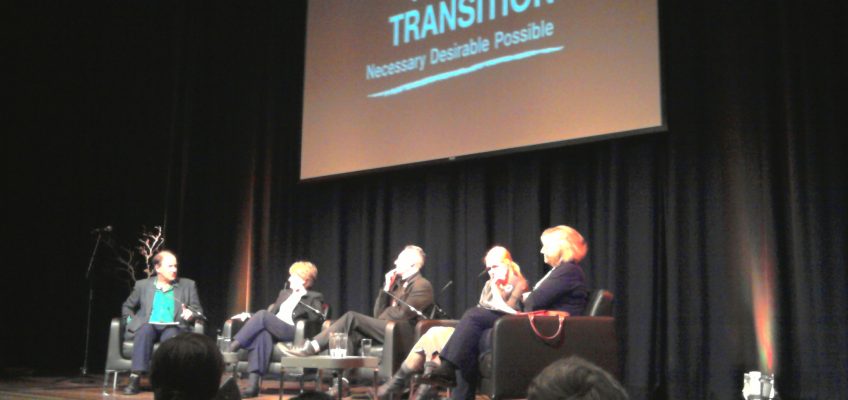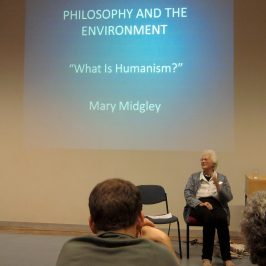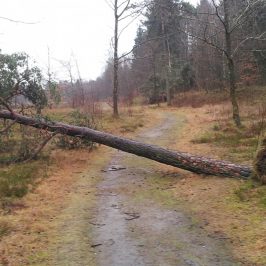In case you haven’t noticed, we’re in the middle of a Great Transition. This is the time of [insert pet doomsday subject here. If you’re not feeling very imaginative try: the sixth mass extinction, global warming or global food/energy crisis]. Change is going to happen wether we like it or not, and is it perhaps going to be the greatest of all transitions we have experienced. It’s hard to imagine, but we’ve got to work on our imagining because there isn’t really a lot of time left if we are to avoid the worst of a series of pretty awful scenarios.
But [insert favourite objection here. E.g. how do we change things, where do we start, the-world-is-so-big-and-mean-and-I’m-just-this-tiny-little-speck-of-dust-without-any-power-to-change-anything-whatsoever]? Well heck, if we are going to hell we might as well have some fun on the way, right? And by the way, I’m not sure the evidence is conclusive, global warming could be made by computers and not humans, and isn’t CO2 good for plants because they grow faster? And really, I’m sick of this talk about climate change, it is up to the politicians to sort out the problem – it’s their job after all.
We all know the objections which = status quo.
Having spent a year studying climate change and having seen the failure in Copenhagen last year (now that I have the chance: Lars Løkke Rasmussen, what an incompetent politician) it is hard not to listen to at least one of those inner voices described above from time to time. So, when the new economics foundation put on an event entitled ‘Where did our money go – Surviving and thriving in the Great Transition’ [my emphasis] in the Southbank Centre, it was a welcome breather from the fog of pessimism and general lack of imagination that pervades much of the debate that is shaping the 21st century. Getting together alternative thinkers and practitioners from fashion to farming, this evening promised to be worth the £27 return ticket to the City.
Andrew Simms opened with an introduction to nef’s work and the Great Transition and Stewart Wallis presided over the 1st session’s panel discussion between Ann Pettifor, author of ‘The Coming First World Debt Crisis’; Tim Jackson, author of ‘Prosperity Without Growth‘; Vivienne Westwood, designer and all-round punk; and Rosie Boycott, chair of London Food. It proved an interesting hour with a fair few radical but reasonable comments and ideas:
- The banking system should be a public good (i.e. regulated): the right to create credit and set interest rates should not be left to private banks. This has created a banking system which is actually borrowing from rather than lending to the economy (we quickly got an answer to the question posed in the title of the event).
- We need to rethink ideas of progress and growth and re-cast our lives in a different role than the consumer. There is value in thinking about ourselves as ‘living in chains’ because we need to break free from the chains of a system that drives ecological disaster.
- Culture connects past, present and future. We need to reassert our culture and re-politicise our lives to avoid becoming victims of propaganda. Without culture, art and fun we too easily get distracted by consumerism.
- There are stories of positive change, such as urban gardening, we need to embrace and spread such initiatives in order to achieve a degree of food security when the food system breaks down. Interesting facts: five companies dominate the world’s seed markets, four companies control 81% of the global beef markets, while 59% of the pork market is in the hands of four companies (3 of them also in the beef business).
- There is a role for political activism, also in the established institutions. Bottom-up change alone is not going to achieve the scale of change that is needed at a fast enough pace. Mobilise and do it loud.
Ruth Potts ended the first session with a quote by Rebecca Solnit from her book ‘Hope in the Dark‘. The message of hope and creating a positive vision for the Great Transition was taken up by Nic Marks who opened the 2nd half of the evening with a 5 minute version of his TED talk on the happy planet index. If you don’t have the time to watch it here’s the spoiler: we have to get emotionally engaged in how we think about progress and start appreciating the things that have real value for our quality of life. Your 5-a-day diet should be: 1) connect; 2) be active; 3) take notice (biking to Liverpool Street from Southbank in average weekday London traffic, I thought this one of particular importance); 4) keep learning; and 5) give.
The second debate, chaired by Andrew Simms, was a discussion between Green Party leader, Caroline Lucas, and Jayati Ghosh, Professor of Economics at Jawaharlal Nehru University. Lucas talked about the need for politicians to be courageous and create a compelling vision of the kind of society we need to become. The debate shifted towards development politics and the problem of pursuing export led growth in developing countries. Ghosh presented some powerful arguments against current policies in China and India, explaining how export oriented economies undermine the livelihood of the poorest, destroys food security and eventually cause unemployment.
She presented three antidotes for the ills of the current development politics:
1) Get multi-lateral institutions to stop imposing trade rules on developing countries;
2) Remove barriers for technology transfer; and
3) Let developing countries be free to for regional coalitions, using the example of Banco del Sur.
I had to leave the debate around 2100 hours to catch a train back up to Norwich so I didn’t have a chance to hear the questions. As I left there a five man strong brass band was waiting outside the lecture theatre, which left my smiling as I remembered Vivienne Westwood’s words: do it loud. Indeed.






Feminism and the dualism disease
I’d like to know if someone out there has done a qualitative comparison of attitudes...